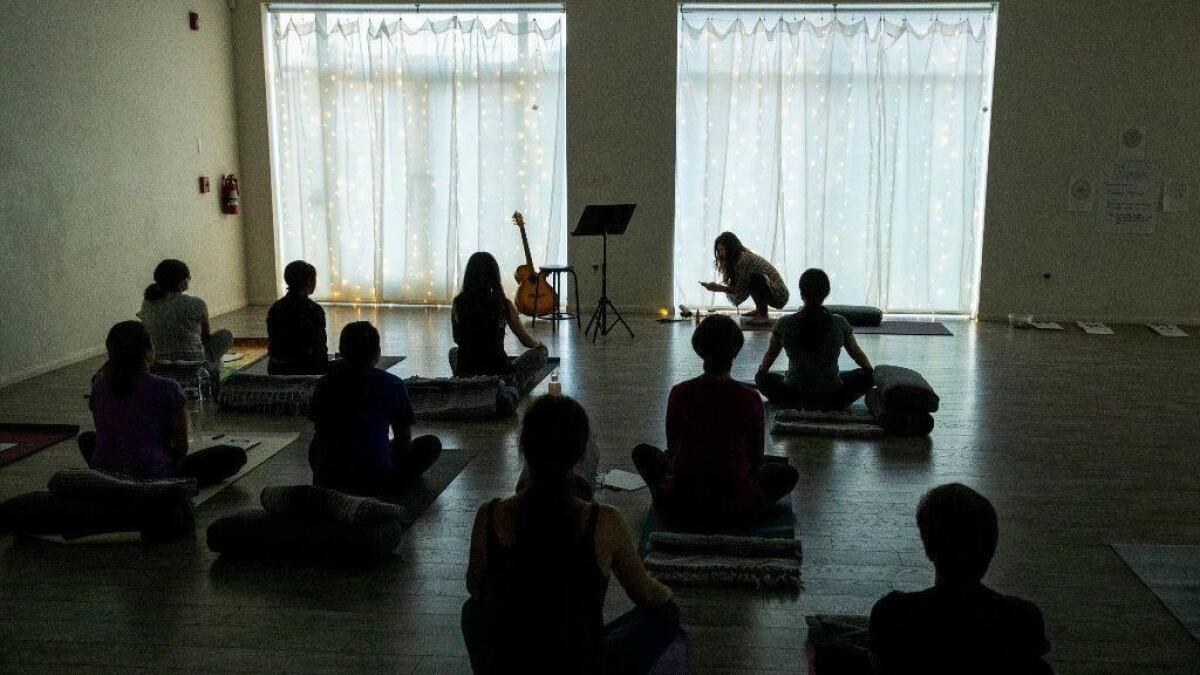Want to embrace mindfulness? Try a complaint cleanse first

If we all wore digital complaint trackers throughout the day — much like the Fitbits and similar devices that religiously count every step we walk — we’d probably be surprised by how much we moan about life’s daily irritations:
“Traffic is ruining my mornings!”
“My date last night was terrible. I’ll be single forever.”
“I still can’t believe how rude that salesperson was to me three years ago.”
But learning how to eliminate those constant, persistent grumblings might be the first crucial step toward mindfulness. It’s called complaint cleansing.
“What happens when we complain is that we are basically training our brain to look at things that we’re not happy about,” said Kaia Roman, a Santa Cruz-based writer and the author of “The Joy Plan: How I Took 30 Days to Stop Worrying, Quit Complaining, and Find Ridiculous Happiness.”
Adds Roman: “When we make a conscious choice to focus on solutions, to focus on things that we do right, the good in life and positive aspects, we actually start changing the neural pathways in our brains to be more optimistic. Then we start to experience life differently.”
Roman said she decided to try a week-long complaint cleanse four years ago at a point when she felt her anxiety and negative thoughts controlled her mind. After those seven days, her anxiety improved, so she decided to keep it up.
“So many of us complain on a regular basis without realizing that we’re doing it,” she said. “When you do a complaint cleanse, you have to be super aware of what you’re thinking and what you’re speaking.”
The first step of a complaint cleanse is to listen to yourself.
That’s the advice of Deepak Chopra, a bestselling author and co-founder of the Chopra Center for Wellbeing. “Whenever you feel that you’re criticizing or condemning or complaining or playing the victim, the first thing is to press the pause button in your mind and actually be a witness to how you’re going to react to the situation,” Chopra said in a recent interview. “If you do that enough, you will realize that your range of options in any situation, in any adversity, in any circumstance is actually infinite. Slowly this will start to influence your life so that you’re not a victim, but a creator.”

When a complaint inevitably does pop into your head during the cleanse, try not to get frustrated with yourself, said Jovon Bernal, a meditation teacher and owner of Downey Yoga. Simply notice the thought without judgment.
“There’s a difference between, ‘That’s bad that I’m thinking that’ and ‘Oh, I wonder why I feel that way?’” Bernal said. “There has to be that process of reflection. That’s where a lot of the growth comes from.”
If that kind of self-awareness sounds similar to meditation, that’s because it is. Meditation is about noticing your thoughts without judgment, then using your breath, a mantra or another technique to bring your mind back to the present. Similarly, complaint cleansing challenges you to acknowledge your negative thoughts — then switch them around to something you feel good about in the present.
That means that if you’ve ever been skeptical of your ability to meditate, Bernal said, a complaint cleanse might make you feel more confident.
“A lot of people do get intimidated when they see the word ‘meditation,’ ” she said. “They think, ‘Oh, it’s too hard; my mind is constantly going.’ ”
But “complaint cleansing is in the realm of meditating,” she said. “It’s just you being still with your thoughts, noticing them and noticing how they make you feel and where they’re coming from and how you can start to retrain your brain so you’re not complaining so much.”
Once you’ve noticed your incoming complaint, the second step in a complaint cleanse, according to Megan Monahan, meditation instructor and author of new book “Don’t Hate, Meditate!” is to decide whether the complaint is worth more energy. (It probably isn’t.)
“Imagine that every thought you have is either feeding a flower in your mind or a cactus. The thoughts that are based in love feed the flower. The thoughts that are based in fear feed the cactus,” Monahan said.
“You have an opportunity every time you have a thought to ask yourself, ‘What is that feeding in my life?’ ”
The final step, if you decide that your complaint deserves no more energy, is to practice gratitude. That could look like a gratitude journal, community service or treating a friend to coffee, Monahan said. It could also take a less tangible form.
“For the longest time, I was really intimidated by meditation, so what I did instead of focusing on my breath or any of the other meditation techniques is I would just wake up, hit snooze on my alarm and think of things that I’m grateful for,” Roman said.
The things you express gratitude for can be as important as friends, family and health or as simple as the color of your bedroom wall, the taste of an apple or the sound of your favorite song. It’s not about the content of your thoughts, Roman said. It’s about the peaceful emotion that your thoughts elicit.
“Just like complaining trains your brain to look for more things to complain about, having a gratitude practice trains your brain to look for things you’re grateful for, so it’s absolutely the antidote [to complaining],” she said.
You won’t just improve your own mental health when you stop complaining and start showing gratitude. Experts say your positivity is contagious.
Roman likes to spread the power of complaint cleansing in the grocery store checkout line. Instead of complaining about the weather or the price of avocados, she suggests mentioning how happy you are to see the sun shining or a sale on your favorite brand of chips. It could affect the person you’re talking to more than you think.
“Most people have no idea how powerful they are,” Monahan said. “Without doing anything other than embodying that which you want to see more of, you can totally change someone’s experience of life.”






